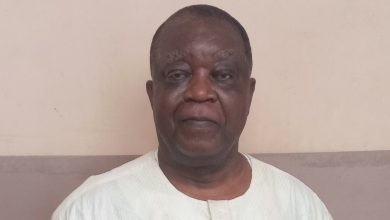2024: EFCC’s year of world records
Fourteen months in the saddle, the EFCC under Olukoyede, has achieved unprecedented breakthroughs in the fight against corruption that eminently qualify him for a place in the Guinness Book of World Records.

By Tunde Nasiru
When President Bola Tinubu approved the appointment of Mr. Olanipekun Olukorede as the executive chairman of the Economic and Financial Crimes Commission (EFCC) on October 12, 2023 and his subsequent confirmation by the senate of the Federal Republic on October 18, 2023, there was no drama or any inkling as to expectations from the anti-graft body under the new helmsman at a period when not a few Nigerians have lost hope and were neither impressed nor encouraged by the performance of the EFCC.
As observed by a journalist, “the journey of EFCC from inception has been one of zigzag or undulating public optics, depending on who was (or is) in charge.
“When Nuhu Ribadu was in charge in year 2003 as the pioneer Executive Chairman, the optics favoured the anti-corruption body as he dragged people hitherto regarded as untouchables before the law courts. He earned plaudits for Nigeria from the comity of nations.
“However, many of the tenures of previous heads of the body, including Ribadu’s, ended abruptly and controversially. The agency was largely seen as a witch-hunting dog of the successive governments in power against perceived political enemies.
“Nigeria continued to slip down in the ladder of Transparency International’s Corruption Index as financial crimes, especially the advance fee fraud popularly known as “419” or “yahoo yahoo”, ‘flourished’ unabated, to the extent that it was commonly said that perpetrators of frauds and financial crimes usually aimed big to make a huge killing from their nefarious activities, calculating the money that would be used to settle the police and operatives of the EFCC.”
The task before Olukoyede was very tall; as tall as the EFCC’s multi-storey headquarters in Abuja; but the new helmsman is also tall and fit for the job. He had a steely resolve to boot.
So, on the day Olukoyede resumed at the EFCC headquarters, immediately after inspecting the mounted guard of honour, he addressed the management and staff of the agency. The new Chairman asked EFCC’s staff to declare their assets with a promise that such assets would be verified. Olukoyede, posited that, for the EFCC, “it can no longer be business as usual.”
While many probably would have thought that the declared vision and mission of the new czar was akin to the usual grandstanding and populist pronouncements of public officials when they assume office; pronouncements that sooner than later wane as days and months pass by, however, there were signs that a new sheriff was in town.
The new EFCC boss soon settled down to business; he came prepared. He had previously served as Chief of Staff to a former Acting Executive Chairman, Mr. Ibrahim Magu, and was confirmed as Secretary to the Commission on November 28, 2018. These are two of the most senior appointments in the Commision.
A legal practitioner and certified fraud examiner (CFE), Olukoyede is also a regulatory compliance consultant with specialty in compliance management, corporate intelligence and fraud management. He had considerable insight and experience in the investigation and civil litigation of fraud and financial crimes.
“My priority as the Chairman of the EFCC is to use the fight against corruption to stimulate the economy”, Olukoyede told Tunes news magazine in an interview.
Despite some stumbling blocks, paucity of funds, inadequate staffing, simulated attacks and well-oiled campaign of calumny in the media by politically exposed persons, Olukoyede soldiered on.
Fourteen months in the saddle, the EFCC under Olukoyede, has achieved unprecedented breakthroughs in the fight against corruption that eminently qualify him for a place in the Guinness Book of World Records. The untouchables have been touched, while past governors and ministers were either docked or undergoing investigations.
One’s position above is not an exaggeration at all. For example, we have heard about recoveries and forfeiture of properties acquired from proceeds of drugs, corruption and so on. There is no where in the history of the world that a whole university has been forfeited to any government as a result of litigation by an anti-corruption agency.
On Friday, June 7, 2024 Justice Joyce Abdulmalik of the Federal High Court sitting in Abuja ordered the final forfeiture of every asset of a private university, NOK University, Gwasmyen Water Factory, Gwasmyen Event Centre and Gwasmyen International Hotel, all in Kaduna State.
EFCC was able to diligently establish before the court, incontrovertible facts that Anthony Hassan, a former director of finance and accounts at the federal ministry of health, built NOK University using proceeds of unlawful activities traced to him.
Physical assets of the University forfeited included Senate building, ICT building, faculty of medicine building, Science building, two Academic buildings, a Faculty Hall and other buildings. This forfeiture of a whole university was unheard of in world history!
As the nation marvels at such unprecedented forfeiture, EFCC was not done yet. On Monday, December 2, 2024, the EFCC achieved another first-of-its-kind forfeiture. It secured the final forfeiture of a-150,500 square meter estate in Abuja, to the Federal Government. The estate is located at Plot 109, Cadastral Zone C09, Lokogoma District, Abuja in Nigeria’s Federal Capital Territory. That was a single largest asset recovery in the history of Nigeria, if not Africa.
The estate contains 753 units of duplexes and other apartments The EFCC alleged that the owner(s) fraudulently built the estate and relied on Section 17 of the Advance Fee Fraud and Other Fraud Related Offences Act No 14, 2006 and Section 44 (2) B of the 1999 Constitution of the Federal Republic of Nigeria.
For the EFCC’s Olukoyede, asset recovery is pivotal in the fight against corruption, economic and financial crimes and a major disincentive against the corrupt and the fraudulent.
Addressing members of the House of Representatives Committee on Anti-corruption the Chairman explained that: “If you understand the intricacies involved in financial crimes investigation and prosecution, you will discover that to recover one billion naira is war.
“So, I told my people that the moment we start investigation we must also start asset tracing because asset recovery is pivotal in the anti-corruption fight; and one of the potent instruments that you can deploy as an anti-corruption agency for an effective fight is asset tracing and recovery. If you allow the corrupt or those that you are investigating to have access to the proceeds of their crime, they will fight you with it.”
The news of the seizure and forfeiture of the expansive Abuja estate by EFCC reverberated throughout the country and beyond. International news agencies reported the almost unbelievable recovery of corruption proceeds and not a few people wondered how many of such high-net properties acquired with illicit funds by corrupt public officials are in the highbrow areas of major cities of Nigeria.
As the year 2024 was gradually grinding to an end, EFCC announced news of yet another “bumper harvest”! Olukoyede disclosed that the Commission, in a landmark raid, had arrested 792 suspects for their alleged involvement in cryptocurrency investment fraud and romance scam. 792 suspects at a go?! That’s a world record!
The suspects were apprehended on Tuesday, December 10, 2024, in a surprise operation at their operational base, an imposing seven-storey edifice known as Big Leaf Building, on No.7, Oyin Jolayemi Street, Victoria Island, Lagos, following verifiable intelligence received by the Commission. I want to believe that arrest was the biggest leap by an anticorruption agency in recent world history.
Speaking during a media briefing on the startling arrest on Monday, December 16, 2024, at the Lagos zonal directorate of the commission, Olukoyede stated that 148 Chinese, 40 Filipinos, two Kharzartans, one Pakistani, one Indonesian were arrested during the well-coordinated operation.
The EFCC’s boss, who spoke though the director, public affairs of EFCC, Wilson Uwujaren, further stated that the foreign nationals used the facility, which could be mistaken for a corporate headquarters of a financial establishment, to train their Nigerian accomplices on how to initiate romance and investment scams and also used the identities of their Nigerian accomplices to perpetrate their criminal activities.
According to him, “All the floors are equipped with high-end desktop computers. On the 5th floor alone, investigators recovered 500 SIM cards of local telcos that were bought for criminal purposes.
The Daily Trust newspaper in its editorial of December 26, 2024 expressed worries about what it called “systemic issues in Nigeria particularly with its security apparatus.”
“For 193 foreign nationals with criminal tendencies to be arrested in a single building underscores a serious disconnect between the public and security agencies among other things. Residents in the vicinity of the building should have raised the red flag immediately they witnessed the unusual activity around the area.
“The failure to do so promptly reflects a lack of communication between Nigerians and law enforcement, as well as an apathetic attitude toward policing. As we have reiterated in previous editorials, this calls for a more proactive approach by agencies like the National Orientation Agency (NOA) to educate citizens on the importance of collaborating with security operatives”, the paper maintained.
While Europe and the USA have reported what were termed the biggest burst of cybercrime syndicate according to a report by the British Broadcasting Corporation (BBC) of May 30, 2024, the number of arrests made during the said operations in Europe and America were nothing significant as compared to the arrest made by the EFCC at the multi-storey ‘university of fraud’ at Victoria Island, Lagos.
As it may turn out, with this groundbreaking discoveries and arrests, the EFCC may have found its way into the Guinness Book of World Records. Who knows?
Tunde Nasiru, a social policy analyst, sent this piece from Abuja





